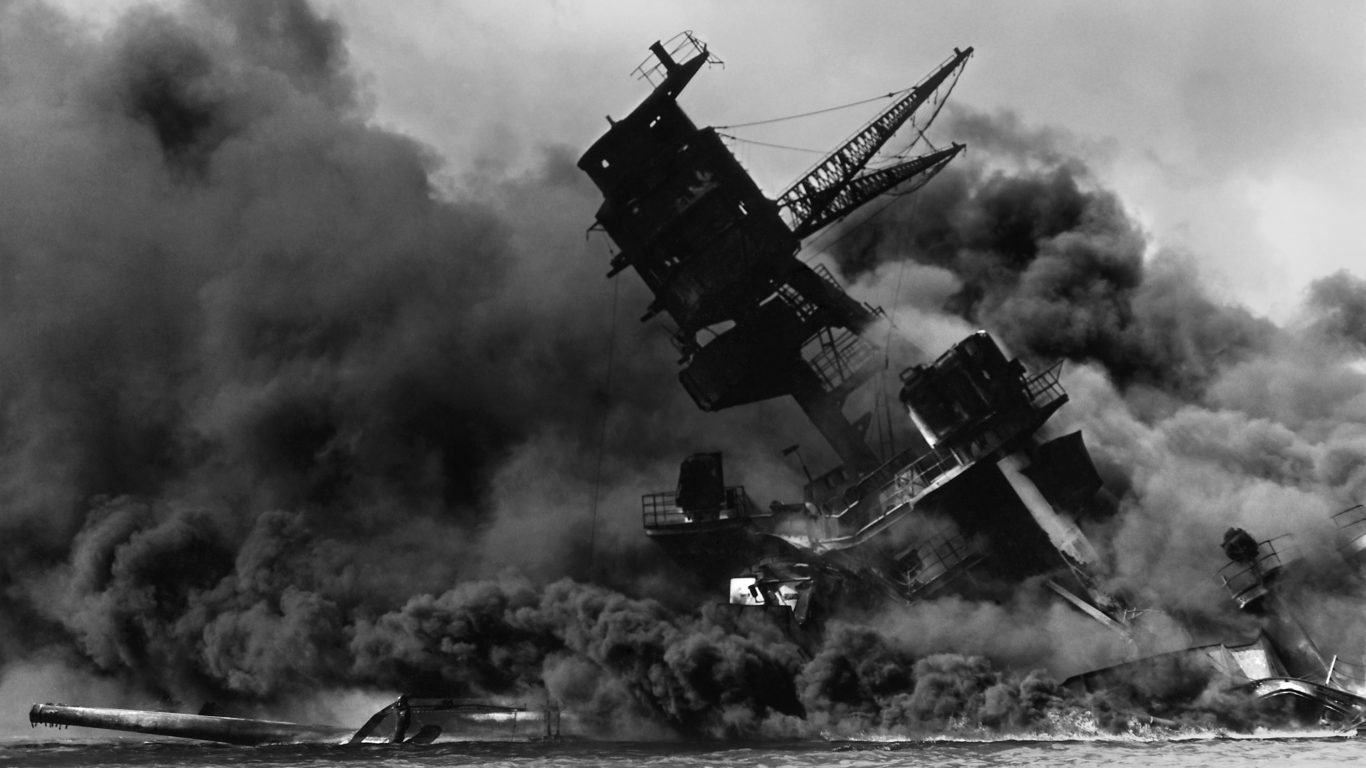Investing
The Second World War saw the United States begin to emerge as the foremost naval power in the world. During this conflict, they built around 5,500 war vessels, which included mass-produced crafts known as Liberty Ships, the largest class of ships in the world at this time. They faced significant challenges and were up against formidable foes on land and sea. While American battleships, carriers, cruisers, and destroyers played a pivotal role in overcoming the Axis powers, many vessels faced tragic fates, succumbing to enemy forces and sinking into the ocean’s depths. This article looks into prominent American ships lost during World War II.
24/7 Wall St. reviewed Allied War Losses compiled by Uboat.net, an online database of ships sunk during the two World Wars to identify the major American ships sunk during World War II. Only the largest U.S. Navy ships – battleships, heavy cruisers, anti-aircraft cruisers, and aircraft carriers – that were sunk in WWII are included, ordered by when they were sunk. Supplemental information about the type and class of these ships, where they were sunk, and when they were originally launched from, also came from Uboat.net.
The Japanese attack on Pearl Harbor on December 7, 1941, (now known as Pearl Harbor Day) was a day marked in infamy as one of the most catastrophic naval assaults in U.S. history. This surprise offensive led to the sinking of several American battleships, including the USS Arizona (BB-39) and the USS Oklahoma (BB-37). (Also see, the most mass-produced U.S. naval ships in WWII.)
The USS Indianapolis (CA-35) was another significant battleship lost. This cruiser of the Portland class was en route to Guam after a covert mission delivering atomic bomb components to Tinian Island. Struck by torpedoes from Japanese submarine I-58, the USS Indianapolis sank in the Philippine Sea within 12 minutes. Out of its crew of 1,196, only 316 survived, with many perishing due to injuries, dehydration, and shark attacks. (A battle with Japan during WWII was the largest in U.S. naval history.)
All the ships listed here met their fate in the Pacific Theater, with the timeline stretching from the outset at Pearl Harbor to the final incidents in the Philippine Sea. Notably, some ships were considerably older than others. While a handful had been launched before World War I, others had just entered service a year before WWII’s end.
These sunken vessels stand as poignant reminders of one of the most monumental naval conflicts in history.
Here are prominent American ships lost during WWII.
USS Arizona (BB-39)
Source: national_museum_of_the_us_navy / Flickr
- Date sunk: December 7, 1941
- Type: Battleship
- Class: Pennsylvania
- Battle location: Pearl Harbor, Hawaii
- Launch date: June 19, 1915
USS Oklahoma (BB-37)
- Date sunk: December 7, 1941
- Type: Battleship
- Class: Nevada
- Battle location: Pearl Harbor, Hawaii
- Launch date: March 23, 1914
USS Utah (AG-16)
Source: Public Domain / Wikimedia Commons
- Date sunk: December 7, 1941
- Type: Battleship
- Class: Florida
- Battle location: Pearl Harbor, Hawaii
- Launch date: December 23, 1909
USS Houston (CA-30)
- Date sunk: March 1, 1942
- Type: Heavy cruiser
- Class: Northampton
- Battle location: Soenda Straight, Indonesia
- Launch date:
USS Lexington (CV-2)
Source: sdasmarchives / Flickr
- Date sunk: May 8, 1942
- Type: Aircraft Carrier
- Class: Lexington
- Battle location: Battle of Coral Sea
- Launch date: October 3, 1925
USS Yorktown (CV-5)
Source: Public Domain / Wikimedia Commons
- Date sunk: June 7, 1942
- Type: Aircraft carrier
- Class: Yorktown
- Battle location: Battle of Midway
- Launch date: April 4, 1936
USS Astoria (CA-34)
Source: anmm_thecommons / Flickr
- Date sunk: August 9, 1942
- Type: Heavy cruiser
- Class: New Orleans
- Battle location: Battle of Savo Island
- Launch date: December 16, 1933
USS Quincy (CA-39)
Source: Public Domain / Wikimedia Commons
- Date sunk: August 9, 1942
- Type: Heavy cruiser
- Class: New Orleans
- Battle location: Battle of Savo Island
- Launch date: June 19, 1935
USS Vincennes (CA-44)
Source: Public Domain / Wikimedia Commons
- Date sunk: August 9, 1942
- Type: Heavy cruiser
- Class: New Orleans
- Battle location: Battle of Savo Island
- Launch date: May 21, 1936
USS Wasp (CV-7)
Source: Public Domain / Wikimedia Commons
- Date sunk: September 15, 1942
- Type: Aircraft Carrier
- Class: Wasp
- Battle location: Battle of Guadalcanal
- Launch date: April 4, 1939
USS Hornet (CV-8)
Source: Public Domain / Wikimedia Commons
- Date sunk: October 27, 1942
- Type: Aircraft carrier
- Class: Yorktown
- Battle location: Battle of Santa Cruz
- Launch date: December 14, 1940
USS Atlanta (CL-51)
Source: national_museum_of_the_us_navy / Flickr
- Date sunk: November 13, 1942
- Type: Anti-aircraft cruiser
- Class: Atlanta
- Battle location: Battle of Guadalcanal
- Launch date: September 6, 1941
USS Juneau (CL-52)
Source: national_museum_of_the_us_navy / Flickr
- Date sunk: November 13, 1942
- Type: Anti-aircraft cruiser
- Class: Atlanta
- Battle location: Battle of Guadalcanal
- Launch date: October 25, 1941
USS Northampton (CA-26)
Source: national_museum_of_the_us_navy / Flickr
- Date sunk: December 1, 1942
- Type: Heavy cruiser
- Class: Northampton
- Battle location: Battle of Tassafaronga
- Launch date: September 5, 1929
USS Chicago (CA-29)
Source: national_museum_of_the_us_navy / Flickr
- Date sunk: January 30, 1943
- Type: Heavy cruiser
- Class: Northampton
- Battle location: Battle of Rennel Island
- Launch date: April 10, 1930
USS Liscome Bay (CVE-56)
Source: national_museum_of_the_us_navy / Flickr
- Date sunk: November 24, 1943
- Type: Escort carrier
- Class: Casablanca
- Battle location: Makin Island
- Launch date: April 19, 1943
USS Block Island (CVE-21)
Source: Public Domain / Wikimedia Commons
- Date sunk: May 29, 1944
- Type: Escort carrier
- Class: Bogue
- Battle location: Canary Islands
- Launch date: June 6, 1942
USS Princeton (CVL-23)
Source: Public Domain / Wikimedia Commons
- Date sunk: October 24, 1944
- Type: Light fleet carrier
- Class: Independence
- Battle location: Battle of Leyte Gulf
- Launch date: December 6, 1942
USS Gambier Bay (CVE-73)
Source: Public Domain / Wikimedia Commons
- Date sunk: October 24, 1944
- Type: Escort carrier
- Class: Casablanca
- Battle location: Battle of Leyte Gulf
- Launch date: November 22, 1943
USS Midway / St. Lo (CVE-63)
Source: Public Domain / Wikimedia Commons
- Date sunk: October 25, 1944
- Type: Escort carrier
- Class: Casablanca
- Battle location: Battle of Leyte Gulf
- Launch date: August 17, 1943
USS Ommaney Bay (CVE-79)
Source: Public Domain / Wikimedia Commons
- Date sunk: January 4, 1945
- Type: Escort carrier
- Class: Casablanca
- Battle location: Sulu Sea
- Launch date: December 29, 1943
USS Bismark Sea (CVE-95)
Source: Public Domain / Wikimedia Commons
- Date sunk: February 21, 1945
- Type: Escort carrier
- Class: Casablanca
- Battle location: Iwo Jima
- Launch date: April 17, 1944
USS Indianapolis (CA-35)
Source: sdasmarchives / Flickr
- Date sunk: July 30, 1945
- Type: Heavy cruiser
- Class: Portland
- Battle location: Philippine Sea
- Launch date: November 7, 1931
Sponsored: Tips for Investing
A financial advisor can help you understand the advantages and disadvantages of investment properties. Finding a qualified financial advisor doesn’t have to be hard. SmartAsset’s free tool matches you with up to three financial advisors who serve your area, and you can interview your advisor matches at no cost to decide which one is right for you. If you’re ready to find an advisor who can help you achieve your financial goals, get started now.
Investing in real estate can diversify your portfolio. But expanding your horizons may add additional costs. If you’re an investor looking to minimize expenses, consider checking out online brokerages. They often offer low investment fees, helping you maximize your profit.
Thank you for reading! Have some feedback for us?
Contact the 24/7 Wall St. editorial team.



